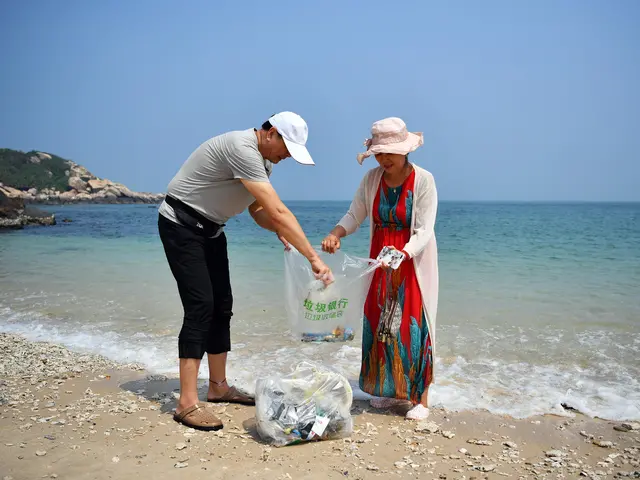Trash in exchange for goods? The seemingly impossible now becomes true thanks to a "waste bank" recently established in southern China's island province of Hainan. Wang Xiaochun and her husband, tourists from northwest China's Xinjiang Uygur Autonomous Region, experienced how the "waste bank" works at Mulan Bay in the city of Wenchang.
Under a staff's guidance, they took out two bags from the "bank" before heading toward the beach to collect garbage.
"It's so beautiful here," said Wang at the sight of the sea and the beach. As they walked on, the couple found scraps of broken glass and plastic caps scattered in the sand and other kinds of waste including plastic bags floating on the sea.
About half an hour later, the couple took two bags of rubbish back and put them into the ATM-like "waste bank" which gave the two a "deposit book" with four stamps representing 40 points after weighing the waste automatically. The couple then exchanged the points for two bottles of water.
"The 'waste bank' enables tourists to protect the local environment while earning themselves a reward by just lifting a finger," Wang said, adding that she hopes it to be promoted all over the island.
The city government began to pilot "waste bank" at Mulan Bay half a month ago. According to the rules, tourists can earn 10 points by collecting 1 kg of garbage and 60 points can be exchanged for a coconut.
"We hope the 'waste bank' can encourage tourists and the public to take an active part in garbage collection and environmental protection," said He Huanbao, vice-mayor of the city.
Though undeveloped, Mulan Bay is a tourist hotspot famous for its unique scenery. However, the rubbish along the seaside is often being criticized.
"Some of the waste were left by tourists, but most were brought by the ocean tides," said He, noting that the government has cleaned up the 38-km-long coastline along Mulan Bay several times recently, clearing a total of 32 tonnes of garbage.
In an effort to set up a long-term mechanism and mobilize the public's participation, the city learned from the experience of other cities and brought in the idea of "waste bank," trying to explore an effective way in waste management.
"It is also conducive to cultivating the public awareness and habits of environmental protection, facilitating the building of a co-management system for ecological environment," he said.
Tang Yungu, a staff member of the "waste bank," was busy serving tourists at the gift exchange site these days. Tang and her family got rid of poverty in 2018 and made a living by doing odd jobs later on.
Now for the "waste bank," Tang's family earns 3,000 yuan (about 425 U.S. dollars) per month.
"With a stable job and salary, We don't have to worry about our livelihood anymore," Tang said.
Sun Fenghua, deputy director of the tourism bureau of Wenchang city, said by employing disprivilege people, the "bank" is also contributing to local poverty alleviation. "Besides a stable salary, they could also sell local products to make extra money," Sun said.
"It is still in the pilot phase," vice-mayor He said. "If successful, the 'bank' will be promoted to other bays and scenic spots in the city, and even villages, towns and urban communities.
 简体中文
简体中文





